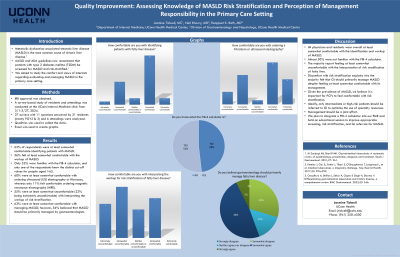Tuesday Poster Session
Category: Liver
P4611 - Quality Improvement: Assessing Knowledge of MASLD Risk Stratification and Perception of Management Responsibility in the Primary Care Setting
Tuesday, October 29, 2024
10:30 AM - 4:00 PM ET
Location: Exhibit Hall E

Has Audio

Jasmine Tidwell, MD
UConn John Dempsey Hospital
Hartford, CT
Presenting Author(s)
Jasmine Tidwell, MD1, Neil Khoury, MD2, Roopjeet K. Bath, MBBS3
1UConn John Dempsey Hospital, Hartford, CT; 2UConn Health, Hartford, CT; 3UConn Health, Farmington, CT
Introduction: Metabolic dysfunction-associated steatotic liver disease (MASLD) is the most common cause of chronic liver disease. AASLD and ADA guidelines now recommend that patients with type 2 diabetes mellitus (T2DM) be screened for MASLD and risk-stratified. Our goal was to study internist comfort and views regarding evaluating and managing MASLD in the primary care setting.
Methods: After IRB approval, we conducted a survey-based study of residents and attendings at the UConn Internal Medicine clinic from 3/1-3/27, 2024. We analyzed 27 surveys with 11 questions from 21 residents (mostly PGY2 & 3) and 6 attendings. We used Qualitrics to collect the data and Excel to create graphs.
Results: 63% of respondents were at least somewhat comfortable identifying patients with MASLD. Similarly, 56% felt at least somewhat comfortable with the workup of MASLD. Only 52% were familiar with the FIB-4 calculator, and only one of the respondents knew the distinct cut-off values for people aged >65. The majority, 60%, were at least somewhat comfortable with ordering ultrasound (US) elastography or fibroscan, whereas only 11% felt comfortable ordering magnetic resonance elastography (MRE). Furthermore, 55% were at least somewhat uncomfortable (22% being extremely uncomfortable) with interpreting the workup of risk stratification. Interestingly, 63% were at least somewhat comfortable with managing MASLD; however, 56% believed that MASLD should be primarily managed by gastroenterologists.
Discussion: Internal medicine physicians and residents were overall at least somewhat comfortable with the identification and workup of MASLD. Almost 50% were not familiar with the FIB-4 calculator. Similarly, the majority report feeling at least somewhat uncomfortable with the interpretation of risk stratification of fatty liver. Discomfort with risk stratification would explain why the majority felt that MASLD should primarily be managed by gastroenterologists despite feeling at least somewhat comfortable with the management of MASLD itself. Given the prevalence of MASLD, we believe it is important for PCPs to feel comfortable with risk stratification. Ideally, only intermediate or high-risk patients should be referred to GI to optimize the use of specialty resources. Management should be a joint effort. We plan on integrating a FIB-4 calculator into our EMR and holding an educational session to help improve appropriate screening, risk stratification, and GI referrals for MASLD.
Disclosures:
Jasmine Tidwell, MD1, Neil Khoury, MD2, Roopjeet K. Bath, MBBS3. P4611 - Quality Improvement: Assessing Knowledge of MASLD Risk Stratification and Perception of Management Responsibility in the Primary Care Setting, ACG 2024 Annual Scientific Meeting Abstracts. Philadelphia, PA: American College of Gastroenterology.
1UConn John Dempsey Hospital, Hartford, CT; 2UConn Health, Hartford, CT; 3UConn Health, Farmington, CT
Introduction: Metabolic dysfunction-associated steatotic liver disease (MASLD) is the most common cause of chronic liver disease. AASLD and ADA guidelines now recommend that patients with type 2 diabetes mellitus (T2DM) be screened for MASLD and risk-stratified. Our goal was to study internist comfort and views regarding evaluating and managing MASLD in the primary care setting.
Methods: After IRB approval, we conducted a survey-based study of residents and attendings at the UConn Internal Medicine clinic from 3/1-3/27, 2024. We analyzed 27 surveys with 11 questions from 21 residents (mostly PGY2 & 3) and 6 attendings. We used Qualitrics to collect the data and Excel to create graphs.
Results: 63% of respondents were at least somewhat comfortable identifying patients with MASLD. Similarly, 56% felt at least somewhat comfortable with the workup of MASLD. Only 52% were familiar with the FIB-4 calculator, and only one of the respondents knew the distinct cut-off values for people aged >65. The majority, 60%, were at least somewhat comfortable with ordering ultrasound (US) elastography or fibroscan, whereas only 11% felt comfortable ordering magnetic resonance elastography (MRE). Furthermore, 55% were at least somewhat uncomfortable (22% being extremely uncomfortable) with interpreting the workup of risk stratification. Interestingly, 63% were at least somewhat comfortable with managing MASLD; however, 56% believed that MASLD should be primarily managed by gastroenterologists.
Discussion: Internal medicine physicians and residents were overall at least somewhat comfortable with the identification and workup of MASLD. Almost 50% were not familiar with the FIB-4 calculator. Similarly, the majority report feeling at least somewhat uncomfortable with the interpretation of risk stratification of fatty liver. Discomfort with risk stratification would explain why the majority felt that MASLD should primarily be managed by gastroenterologists despite feeling at least somewhat comfortable with the management of MASLD itself. Given the prevalence of MASLD, we believe it is important for PCPs to feel comfortable with risk stratification. Ideally, only intermediate or high-risk patients should be referred to GI to optimize the use of specialty resources. Management should be a joint effort. We plan on integrating a FIB-4 calculator into our EMR and holding an educational session to help improve appropriate screening, risk stratification, and GI referrals for MASLD.
Disclosures:
Jasmine Tidwell indicated no relevant financial relationships.
Neil Khoury indicated no relevant financial relationships.
Roopjeet Bath indicated no relevant financial relationships.
Jasmine Tidwell, MD1, Neil Khoury, MD2, Roopjeet K. Bath, MBBS3. P4611 - Quality Improvement: Assessing Knowledge of MASLD Risk Stratification and Perception of Management Responsibility in the Primary Care Setting, ACG 2024 Annual Scientific Meeting Abstracts. Philadelphia, PA: American College of Gastroenterology.
